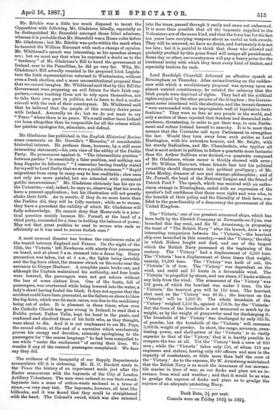Lord Randolph Churchill delivered an effective speech at Birmingham on
Thursday. After animadverting on the sudden- nen with which a revolutionary proposal was sprung upon an almost untried constituency, he refuted the calumny that the Irish people were deprived of rights. They had all the political rights enjoyed by the other peoples of the Kingdom ; the Govern- ment never interfered with the elections, and the tenant-farmers "were surrounded with an impregnable wall of legislative forti- fications." They were as free as any people in the world, and only a section of them rejected that freedom and demanded inde- pendence, threatening, in order to get their way, to ruin Parlia- ment and reduce Ireland herself to anarchy. It is to meet that menace that the Unionists call upon Parliament to strengthen the law. Would they turn away from such guides as Lord Hartington, with his unbroken honour, and Mr. Bright, with his sturdy Radicalism, and Mr. Chamberlain, who typifies all that is most ardent in politics, to follow a quartette more fantastic than Sir Arthur Sullivan ever devised,—a quartette composed of Mr. Gladstone, whose career is thickly strewed with error; of Sir William Harcourt, whose friends fear lest bis political versatility should degenerate into political profligacy ; of Mr. John Morley, dreamer of new and strange philosophies ; and of Mr. Parnell, the head of the National League and the friend of Patrick Ford P The speech, which was received with an enthu- siasm strange in Birmingham, ended with an expression of the speaker's full confidence that those were right and wise who, in the breadth of their policy and the liberality of their laws, con- fided to the guardianship of a democracy the government of the United Kingdom.


































 Previous page
Previous page